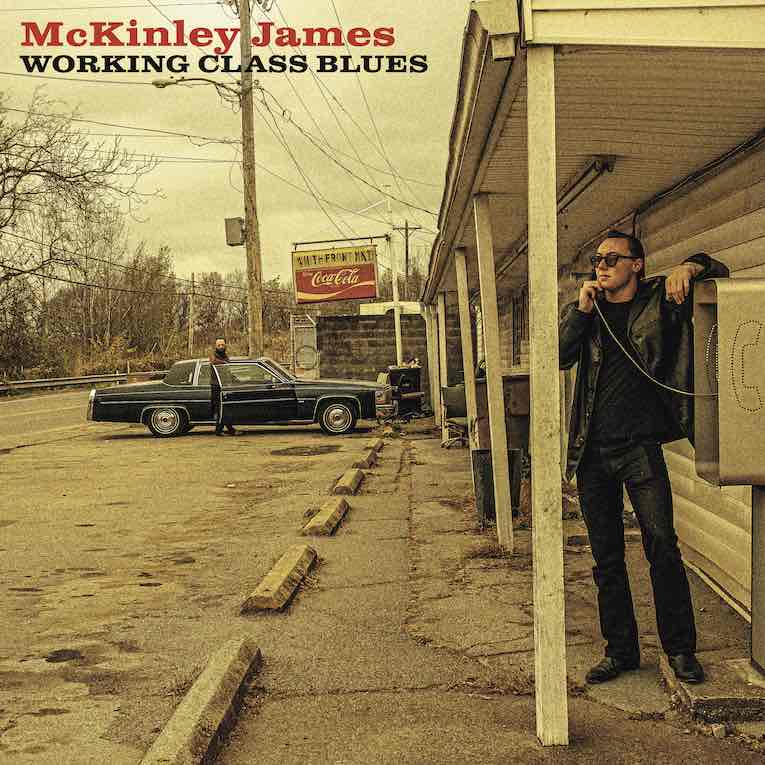
Review: McKinley James ‘Working Class Blues’
By Hal Horowitz
The family that plays together… stays together?
While that may not always be true, particularly where brothers notoriously spar with each other (The Kinks, Oasis, Black Crowes), it’s more likely when the participants are father and son.
That’s the situation with guitarist/vocalist McKinley James, who has played and recorded with his father/drummer Jason Smay, for the past six years. Since dad is a professional musician (Los Straitjackets and JD McPherson in his resume), he is cognizant of the business pitfalls, acting as a built-in mentor for his son.
The combination works musically too.
The duo started as a trio, adding a keyboardist to fatten the sound. That triad released a batch of singles, a few EPs (2021s Still Standing By was assisted by Dan Auerbach, always a good sign) and 2022s Live!, a rollicking set where the well-earned exclamation point reflects the crackling performance.
But for this, James’ debut studio full-length, the father-son team, who also co-produced, strip down to just guitar and drums. It’s a bold move and an unusual one, especially for an act entering the crowded and competitive blues-rocking field. Additionally, they recorded it live, in a home studio constructed in their barn fitted with analog gear. While that might seem to limit the results, conversely the final product is enhanced by the raw, but far from ragged, methodology.
The tunes, all written or co-penned by James, generally kick off with a repeated blues or soul-styled lick which flows into melodies that seem familiar on initial listen. Although he’s from upstate New York, parent and son have steeped themselves in Texas blues shuffles. Originals such as “Call Me Lonesome” (where he sports a trademarked lazy Jimmy Reed vibe), “Get to My Baby” and the opening “Movin’,” the first single, nail a standard blues tempo and could be covers of obscurities from the Fabulous Thunderbirds or Jimmie Vaughan.
But James crafts others infusing his love of classic R&B into the spotlight. That’s evident on the unrequited love ballad “Just a Little Bit” (“You had a good thing going but you left it astray,” he sings with downhearted melancholy). He also goes full 60s on the snappy, pop leaning “Leadin’ Me On,” (“All the time that you wasted baby/We could be spending alone”). “Wait and See” combines blues with a garage twinge as his father pumps a steady beat. And while the swinging “Say Goodbye” hews a little too closely to Tyrone Davis’ soul hit “Can I Change My Mind,” James pulls it off with authority and verve.
The relaxed sway of “Stay With You” captures a perfect sweet spot between archetypal 60s soul and a bluesy command that’s rootsy yet unpredictable. “Till It’s Gone” closes the set with a slow groove Boz Scaggs would envy as it jumps off from the concept of William Bell’s iconic “You Don’t Miss Your Water,” with James’ emotional testifying.
What’s most impressive is the organic attitude, makes the listener seem like a fly on the wall of the makeshift studio. James’ casual vocals don’t play to the cheap seats, but charming, effortless and spontaneous style fits these songs. He’s convincing and natural, delivering unassuming lyrics that might seem modest but work well with the sparse setting and the graceful approach.
“Less is more” is an often overused cliché. But in the case of the impressive Working Class Blues it applies. McKinley James and his dad create moving roots music with just two instruments and a lot of heart. And they’re just getting started.
Pre-order ‘Working Class Blues’ here
Watch “Stay With You”

Leave A Comment